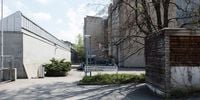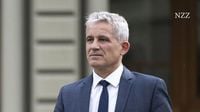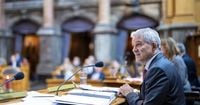A high school thesis at the Zürcher Gymnasium Rämibühl has sparked significant controversy due to allegations of censorship surrounding a student's investigation into the communication style of SP-Bundesrat Beat Jans. The 19-page thesis, which was supposed to provide insights into Jans' communication strategies, has been heavily redacted, with only the table of contents and acknowledgments remaining visible, according to the Neue Zürcher Zeitung (NZZ).
The accompanying documentary film, also created by the student, has been similarly affected, with much of its content cut down to just two brief excerpts. The allegations of censorship have been directed at Jans' communications chief, Oliver Washington, who has denied any wrongdoing but acknowledged that there were inconsistencies in the communication between him and the student.
On April 16, 2025, Washington stated that it was never agreed upon that the documentary would be published, clarifying that the student, who is the daughter of a family friend, had deviated from the initially presented concept. He explained, “The student has not adhered to the agreement, and I asked the school board not to publish the film.” Washington emphasized that his communications were intended to be shared in a private and friendly context, and only the supervising teachers and assessors were meant to have access to the materials he provided.
Despite the initial request to limit the film's release, Washington later reversed his decision, allowing the school to show the film due to heightened media interest. He stated, “Due to the significant media interest, I have decided that the school can make the film available in the usual manner.” However, the film is still not accessible to the public, as the school indicated that the exhibition featuring the thesis and the film would conclude with the spring break, leaving many questions unanswered.
The school administration has also weighed in on the matter, asserting that there were misunderstandings between Washington and the student. They confirmed that the student had complied with the agreements regarding quotations, images, and sound recordings. Furthermore, the school clarified that the student had blacked out several passages of her thesis herself for the exhibition, countering claims of censorship by the EJPD. The administration stated, “There was no censorship intervention by the EJPD,” despite the student's claims on the title page of her work.
The thesis, which has drawn considerable attention, is currently displayed in the hallways of the Zürcher Gymnasium Rämibühl, with the word “Zensuriert” (Censored) prominently featured on its title page. The student’s work not only critiques Jans’ communication style but also reflects on the political dynamics that influenced its creation. The documentary film, titled “Bundesrat Beat Jans: authentischer Kommunikator oder kalkulierender Schweiger?” (Federal Councillor Beat Jans: Authentic Communicator or Calculating Silent Person?), aims to reveal the hidden aspects of political communication.
In the limited footage that remains from the film, one scene features a speech trainer evaluating Jans' public appearance during his election, while another discusses a report from SRF that caused a dispute between Jans' team and the editorial staff. The film's poster states, “Planned as an analysis from the outside, landed in the middle of political infighting. Interview withdrawal, legal advice, and power games instead of open dialogue.” This tagline encapsulates the tension between the student's academic intentions and the political realities that emerged.
The controversy surrounding the thesis has raised broader questions about the appropriateness of governmental intervention in educational projects. Critics are questioning whether it is reasonable for a federal department to become involved in a high school student's work, particularly when the student was attempting to engage critically with a public figure's communication strategies. Washington's role as both a communications chief and a former journalist adds another layer of complexity to the situation.
As the situation evolves, the school has maintained that the thesis was intended for internal purposes only and declined requests for public access. The headmistress, Susanne Kalt, has stated, “It is not a censorship intervention by the EJPD.” This statement reflects the administration's position that the student’s actions were within the bounds of the agreements made, despite the public perception of censorship.
The student’s experience has undoubtedly been frustrating, as her year-long effort culminated in a work that has been significantly altered. In her acknowledgment section, she reflects on her journey, noting that a particular individual has taught her an important lesson: “Never feel too comfortable!” This statement, though lighthearted, underscores the challenges she faced while navigating the complexities of political communication and the pressures exerted by those in power.
As of April 17, 2025, the situation remains unresolved, with the thesis and film not available for public viewing. The ongoing dialogue around this incident highlights the delicate balance between academic freedom and political influence, a topic that resonates deeply within contemporary discussions about education and governance.






